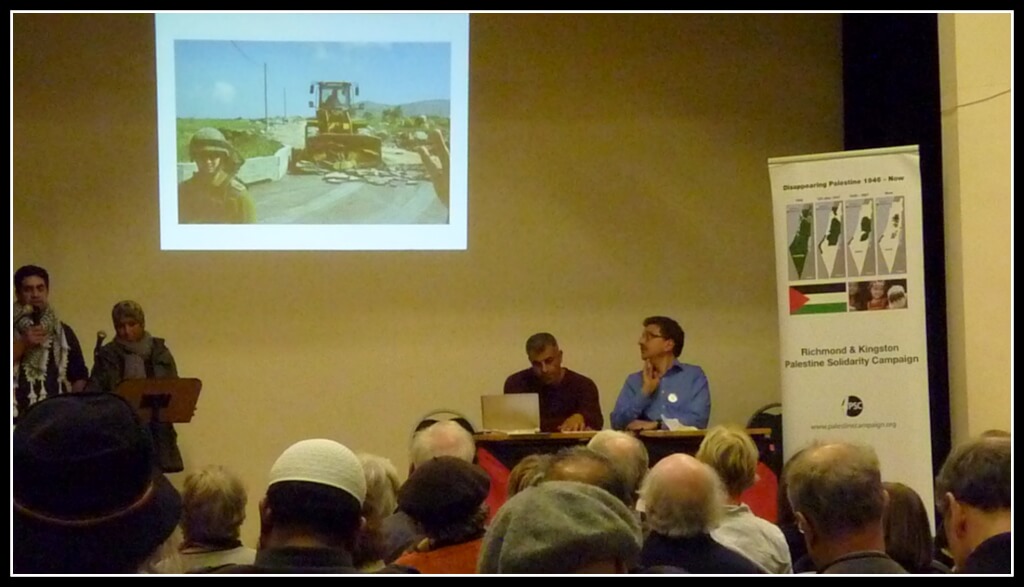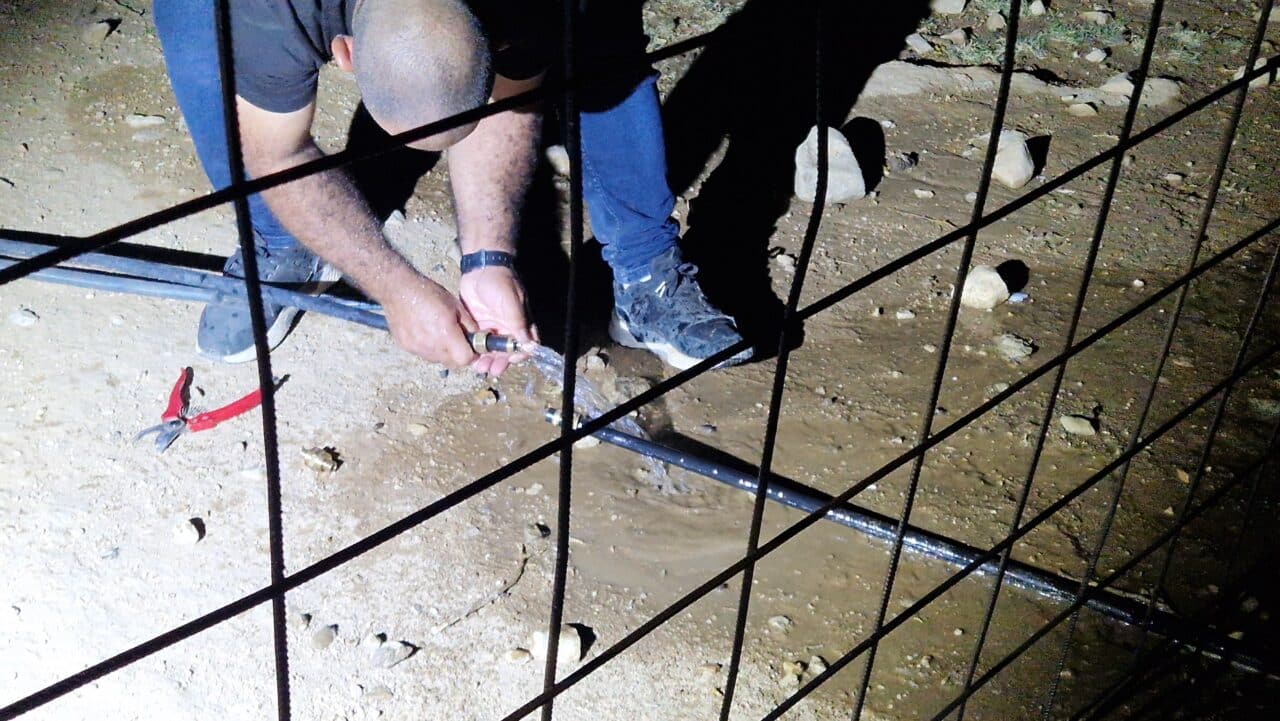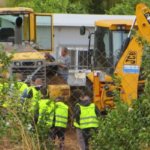Jordan Valley Solidarity London Meeting
Thank you to Brian Durrans of West London Palestine Solidarity Campaigbn for this report
The Palestinian Jordan Valley In The Spotlight – Report Of Public Meeting
According to a survey conducted last year, over 60% of Israelis believe the Jordan Valley to be part of Israel. In reality, this outstandingly fertile region accounts for nearly a third of the Israeli-occupied Palestinian West Bank (http://972mag.com/polljordanvalley/16270/). Through expanding and consolidating ‘settlements’ (or colonies), ‘ethnically-cleansing’ Palestinians from lands they have farmed or grazed for generations, and demolishing or taking over their homes – all of which actions breach international and humanitarian law – the Israeli occupiers of Palestine continue to turn military occupation into outright thievery. Nowhere is this is process more blatant yet more inconspicuous than in the Jordan Valley.
 Voices of resistance
Voices of resistance
In Hammersmith on 22 February, two Palestinians from the Jordan Valley addressed a large and attentive audience at a meeting arranged jointly by Richmond & Kingston and West London PSC branches. Drawing on their personal experience, they described in vivid and chilling detail how Israel practises its apartheid policies in this region while the world’s attention, even that of the solidarity movement, is mainly focused elsewhere. But the two speakers, both seasoned activists in non-violent popular resistance, set this regional experience in the context of the wider West Bank, of the whole of occupied Palestine, and of the responsibilities and growing activity of the international solidarity movement. The Hammersmith meeting was the first of many that will hear their testimony as they continue a tour of venues in the UK and Europe, organised very enterprisingly by Brighton Jordan Valley Solidarity.
Buyer beware
To the outside world, the words ‘Jordan Valley’, cynically used in Israel’s labelling of agricultural exports, is widely misinterpreted as referring to the produce of Palestinian farmers who benefit from its sale. Alas, that is not necessarily the case. In truth, such produce is likely to be grown on stolen land and is thus a legitimate target for the accelerating, and ever-more essential, Palestinian-led international boycott campaign. Except for those producers, such as the respected Zaytoun co-operative, whose genuine independence has been rigorously checked, some Palestinian companies, whether producers or active in the supply chain, are in practice complicit with the occupation. The simple lesson? If in doubt, don’t buy!
Into the spotlight – denial of basic rights
Journalists and news-teams source their stories (however accurate or biased) largely in towns and cities; few venture into the countryside. The Occupation seeks in general to privilege the settlements and destroy the Palestinian economy, but in the Jordan Valley it has been able to do so out of the spotlight, which allows it to get away with severe and systematic discrimination that would provoke justifiable outrage if better reported – or reported at all.
The speakers highlighted the outright denial to Palestinian villages of, or in some cases protracted delay in securing , such elementary services as electricity, schools and – perhaps most shocking of all – drinking water. All these things are routinely provided to Jewish-only settlements. Pylons carry power-lines into settlements via Palestinian land but not to Palestinian homes or enterprises. Pipes supply water to settlements from Palestinian springs through Palestinian villages yet Palestinians themselves are forbidden to drink it. Even more shockingly, while water-tanks are constructed for the settlements, those constructed by Palestinians for their own use are destroyed by the military. Denied official schools, Palestinian communities – helped by international solidarity activists – have begun to build their own. Electricity, water, education – basic needs and essential to any viable future for Palestine. This is not just apartheid but the attempted strangulation of an economy and of a people.
Seizing the initiative
But the people are building schools and combatting by non-violent means the physical and bureaucratic violence used against them. That’s the inspiration for all of us. The Jordan Valley may have been ‘out of sight’ even for much of the pro-Palestinian solidarity movement, but its people have a proud and growing record of determined and imaginative resistance. The slogan To Exist is to Resist!, proclaimed on walls and posters throughout the OPTs, applies as powerfully in the Jordan Valley as anywhere.
Lessons in solidarity
Even by the standards of the best-integrated activism between other parts of Palestine and international solidarity, the Jordan Valley Solidarity Movement is a shining example of what can be achieved by courage, intelligence and commitment. It ticks all the boxes:
- a resourceful use of social media to share detailed information
- to prompt and improve the persuasiveness of BDS actions we can all take in our localities and supermarkets,
- in relation to companies such as Veolia that are provably complicit in Israel’s breached of international law, and
- to deliver practical help on the ground to particular communities in the Jordan Valley, such as by students from the University of Sussex.
Boycott, Divestment, Sanctions – answering the people’s call
It is still sometimes claimed that Boycott, Divestment and Sanctions threatens Palestinian wellbeing where the choice is between working for the Occupation or unemployment. A similar objection was routinely raised against equally non-violent mass activity that eventually helped bury South African apartheid. The BDS argument is crystal-clear: through their own democratic and grass-roots organisations, and through their own actions, the overwhelming majority of Palestinians, like the overwhelming majority of South Africans thirty or forty years ago, have themselves called for this form of support. The two speakers in Hammersmith left no-one in any doubt that the call for BDS comes as strongly from the Jordan Valley as from any other part of Palestine.
To turn the tide
The Israeli Occupation has lasted for 44 murderous and oppressive years. Palestinians have waited too long for their human rights, and in the Jordan Valley those rights have been eroded more thoroughly and more insidiously than anywhere else. The time has come to turn the tide. Every step forward in one aspect of the Palestinian struggle for human rights is a step forward for the struggle as a whole. The resistance in the Jordan Valley – spearheaded by Jordan Valley Solidarity (www.jordanvalleysolidarity.
Report by Brian Durrans, West London PSC


